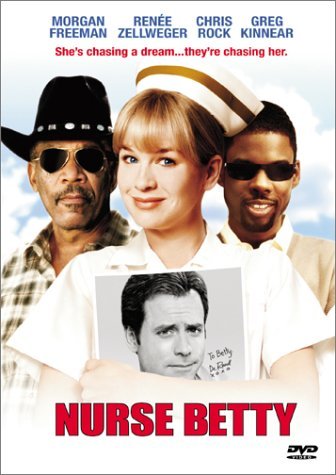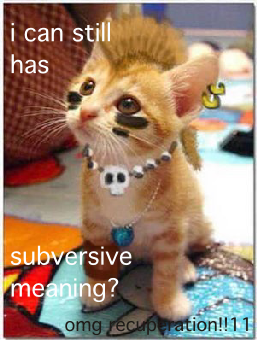February 10th, 2008 by nlang1
This summer I became obsessed with the bad movie phenomenon that has been taking off all over the internet. If you aren’t familiar with what I am talking about check this youtube video out.
Originally I was just checking out the videos out for a quick laugh but eventually I found myself doing a little bit more research on some of the forums at BadMovies.org and reading about what these “fans” were talking about. Interestingly, Troll 2, the film lampooned in the youtube video for awful dialogue delivery, has developed a substantial cult following partially due to the success of viral videos like the one mentioned above. Michael Stephenson, the child actor in the film, is currently directing a documentary film called The Best Worst Film Ever which follows the film’s cult standing and staple at late night cinemas around the country as well as annual Q&A sessions between the filmmakers, actors and fans. We’ve talked a bit about the tendency of audiences or fandoms to gather around content they don’t necessarily think is particularly good (I.E.-sarcastic fans of Heroes or Saturday morning cartoons). This pseudo-franchising that has happened with Troll 2 and similar terrible slasher-esque cult favorites (Sleepaway Camp, Prom Night) is indicative of this new trend which has fans re-appropriating and redefining their respective content. Check out this “trailer” for Troll 2 which has been entirely re-edited as a feel good, festival independent darling. I have always found fan cultures of terrible media really interesting and it’s funny to see that viral media has helped redefine these fandoms by making mass presentations of fan media easier.
I’m interested to see Stephenson’s film and find out how important brief and out of context clips such as the infamous “Oh my gosh!” scene have been to giving this film an entirely different life outside of VHS and sarcastic threads on Something Awful forums.
Posted in Uncategorized | Comments Off
February 9th, 2008 by Danielle
So, I was having an extreme senioritis afternoon yesterday and came across these two videos on College Humor. They both take scenes from a movie and place them in a different order and context so that the movie appears to have a totally different meaning than the original. The first clip uses scenes from Ferris Bueller’s Day Off to portray the film as a horror film rather than a comedy. The second clip does very much the opposite by making scenes from American Psycho appear to be part of a romantic comedy. These videos made me think of the Fiske reading and his definition of producerly texts in that these texts seem to have gaps large enough within them that entirely new texts can be produced in them. Even though we perceive these videos to be funny and sort of ridiculous because the new texts appear so different from the originals, we can still understand how these texts could make sense when the scenes are put into a new context. So, are these examples of texts being, as Fiske says, beyond their own control?
Ferris the 13th
American Psycho- Romantic Comedy
Posted in Uncategorized | 3 Comments »
February 8th, 2008 by aweintr1
I’ll start this post off by saying that relating it academically MAY be a stretch, but I think anyone who takes the time to watch these youtube clips will understand. Both are parts of a video made by 80’s soap opera celeb Brenda Dickson. In each she tells viewers her point of view on fashion, makeup, excercise, and diet. They are long(ish), but totally hilarious.
Clip 1:
Clip 2:
Questions concerning the Clips:
1. These clips are examples of media made for fans of a particular celebrity (presumably because she isn’t in character in the film.) How do these fans affect the theories made by Seiter of soap opera fandom? Do the fans of celebrities in a given fantext exist in the same fandom as the fans of the text itself?
2. On Youtube, most people watch this clip ironically, which is how it became viral. What does it mean to be an ironic fan? Is there a difference in fan practice? In trying to decide the answers, keep in mind that many of the fans have created new fantexts by restaging the video parodically (For Ex: http://www.youtube.com/watch?v=goOsKCok6FM&feature=related). As someone who isn’t typically involved in fantexts, I was also wondering if there is usually a tongue-in-cheek element inherent in most of the practice? While I understand that people take the quality of slash/het seriously, is there still some sort of a joke involved? If not, is that one of the differences between fan practice and ironic fan practice?
3. Finally, do viral videos like these exist as separate fandoms or are they all part of a common one? Given that there are TV specials devoted to airing sets of these clips (see The Soup). I’m inclined to think that their may be a viral video fandom, and that I may be a fan of them.
Posted in Uncategorized | 1 Comment »
February 7th, 2008 by Ben
The FreeCulture convention I was talking about in class is called ROFLCon. It’s run by FreeCulture Harvard. Their goal is to bring every famous internet celebrity they can. The catch is that the person must only be famous because of the internet. For example, the LOLCat Bible guy is coming.
I’m going to try to get funding to go. If you’re interested, get in touch with me at bmazer1 or in class.
Posted in Links | Comments Off
February 6th, 2008 by nlang1

After reading the Hebdidge piece regarding subcultures, I was struck by how well he defined the process by which a subculture – or the content they are gathered around – becomes incorporated into mass media and culture. Basically when the “noise” becomes part of the definition of “sound”.
In class on Tuesday we even took this one step further when one of the discussion groups provided an archetypal example of this sort of incorporation; Hot Topic and gothic/punk culture. Hebdidge categorizes subculture incorporation with two key examples of how they may “breach our expectancies” (Hebdidge, 92). The styles that set apart these subcultures are most easily recognized and thus come first (I.E. – Makeup, dark hair, leather, etc). After these are made apparent in mass culture we come into contact with their greater implications of attitude and beliefs (I.E. – anarchy, satanism, etc).
The interesting fact about these subcultures, regardless of what their beliefs actually entail, is that they are almost always adapted and redefined for mass consumption. The Sex Pistols were signed by every major record label in the UK for at least some period before Virgin Records put out Never Mind the Bullocks. Sure they were dropped by two or three record labels before Virgin due to their legendary drug abuse, and destructive tendencies but the fact remains that they inevitably released the album to the greater public through the very social constructs they despised and to the same people John Lydon complains about almost daily on his radio talk show.
The price of getting your art out into the public means artists like Anti-Flag, Rage Against the Machine or even a Green Day means adapting your doctrines for a mass media audience. Would they prefer if their albums were printed entirely on recyclable materials and their tours were supported by non-corporate sponsors? Probably, but the fact remains that given the pervasiveness of media conglomerates and their control over media content, it doesn’t seem unreasonable to understand when RATM puts out albums through Epic Records and plays at Coachella.
After all, lead guitarist Tom Morello once famously said “When you live in a capitalistic society, the currency of the dissemination of information goes through capitalistic channels. Would Noam Chomsky object to his works being sold at Barnes & Noble? No, because that’s where people buy their books. We’re not interested in preaching to just the converted.”
Posted in Uncategorized | 2 Comments »
February 6th, 2008 by Bob

Below are some questions you might write about in relation to Nurse Betty and/or the week’s readings. Feel free to respond to any of them here, or to raise other questions / share other perceptions about the film and articles.
- As I suggested in class on Tuesday, Nurse Betty has some similarities to Love and Death on Long Island: both seem to address the phenomenon of fandom, yet both do unexpected (and problematic) things with the idea of attachment and immersion in media texts and characters. Where do you see the two films “agreeing” and “disagreeing” in their conception of fandom? To what degree do these portrayals ring true for you, and where do they break down?
- Betty’s quest is triggered by trauma, suggesting that her “mission” is about escape into fantasy as much as in pursuit of a new life. What is the film saying about the psychology of fandom? Is Betty’s journey ultimately a positive and healthy one?
- Gender is very much on the table in Nurse Betty, as are — to a lesser degree — race and class. Where do you see the film addressing difference and identity, and when/where does it choose not to address them?
- What light do the Radway and Seiter articles shed on Nurse Betty? How closely do the readers of romance novels studied by Radway and the soap opera audiences studied by Seiter et al match up with what the film presents? What might account for the differences?
Posted in Prompts, Screenings | 5 Comments »
February 5th, 2008 by Steve
Today in class, one group brought the debate between Star Wars fans about whether or not George Lucas has the ability to change his text. I found this interesting because a couple days ago I saw a message board on IMDb.com that was discussing whether George A. Romero’s new zombie movie Diary of the Dead is part of his zombie canon. For background knowledge, the reason why this debate occurred is because the new movie takes place during the beginning of a zombie outbreak while Romero’s previous four films have shown a progression within an outbreak. Although the discussion on the actual board is not all that enthralling, I found the concept to be interesting. I was wondering what seems to be the common belief with regards to canon, is it simply whatever the producer says is true or are the fans the actual judge of what is canon? Also, if the fans are the deciders why is there a distinction between canon and fanon?
Posted in canon | 1 Comment »
February 5th, 2008 by Ben
Greg and I discussed this at the end of class. This is what resulted. 
Posted in Uncategorized | 9 Comments »
February 4th, 2008 by Ariel
I know a lot of people have been sort of tossing around the topic of Beatles fandom for a while without us ever really addressing it, and I just watched Across the Universe this weekend, so the topic’s been on my mind. It seems to me that music fandom can take two slightly different shapes: fan activity centering on the musical artists and fan activity centering on the music itself. The former is like any kind of celebrity culture: you can engage with singers the same way you can engage with actors, mostly (in my opinion, anyway). But engaging with music is totally different from engaging with movies or TV. Covers and remixes, for example, are clearly fannish activities.
But what about the Beatles, specifically? How would we classify Across the Universe, a musical with all Beatles songs (similar to Mamma Mia and…that one with Billy Joel songs, only far more awesome)? What about Love, a Cirque du Soleil show with an entirely Beatles soundtrack? If we’re looking at fandom as a subculture (as suggested, perhaps, by the Hebdige article), how do we deal with the fact that the Beatles are so universally canonized (in both the canon/fanon sense and the made-a-saint sense)? As far as I know, it’s often seen as weird to *not* like the Beatles, which is a little counterintuitive as far as fandom goes. I think this also ties in very closely with the distinction between fandom and…inspiration or influence. We can’t say that everyone who’s been influenced by Orson Welles or Francis Ford Coppola is necessarily a fan of theirs. So what of all the people who started bands because of the Beatles (or REM, or Nirvana, or Pearl Jam, or Green Day, or whoever)? If you’re writing an original song in the style of the Beatles, is it fannish or just inspired-by? Or both? Rufus Wainwright did a concert a few months ago that was all Judy Garland songs, because he idolizes her so much, but that was called a tribute concert, not a fan concert. Is there a difference?
There’s also the question of concerts — personally, I’ve had some of the most communal experiences of my life at concerts, and if an integral part of fandom is community then that definitely counts as fandom. I’d posit that music festivals are in some sense analogous to conventions, but having never been to one, it’s hard to say.
Posted in Musings, music | 7 Comments »
February 4th, 2008 by nlang1
Bob gave me a heads up on a response thatwas made on the Convergence Culture Consortium about the NY Times article I posted regarding the issue of fan fiction and a critically acclaimed but ratings incompetent shows like NBC’s Friday Night Lights.
I have to admit that I strongly agree with pretty much everything she says in her response to the article and frankly it brings to light a lot of the same questions I asked myself when I decided to take this course and when I began my fanifesto (although I left FNL off for reasons I am not completely sure of).
I consider myself a serious fan of the show but my fandom is not manifested in any sort of creative manner. I think about the show a lot, I check their ratings information on Zap2it as soon as possible after a new episode airs and it always kills me when their share or ratings are down even a point. Furthermore, I post on forums about the show, read and watch interviews with cast members and keep myself entirely up to date on the actor’s and actresses careers (most notably Zach Gilford who was coincidentally my trip guide on an outdoors trip I took to New Zealand two summers ago).
Li argues that Heffernan’s article ultimately made the mistake of assuming fans of the show are not actively involved in participatory fan cultures like those associated with Heroes or Star Trek because it is simply too good. Part of me actually sort of agrees with this assumption but I say this only on a personal level.
Let me put it this way. I got to know Zach Gilford pretty well on the trip I took with him but as soon as I started watching the show, I completely detached the character of Matt Saracen from Zach Gilford the actor that I knew. That really excited me. I rarely get excited over television narrative because I always end up eventually getting really disappointed due to absurdity of a show’s narrative as it continues (Prison Break, 24) or end up getting attached to a show that’s end comes too soon (Tom Goes to the Mayor, Arrested Development). Friday Night Lights has always genuinely kept my interest and I find myself constantly pleased with the direction the narrative takes and frankly I have no interest in thinking of alternative plot possibilities or messing with the careful balance of the show I have in my mind.
The show is personally too good for me to actively enjoy on any level other than constantly singing its praises, interacting with other fans regarding the show’s future, etc. Maybe when the show is inevitably cancelled I will participate in other manners but for the time being I am too invested in the show’s characters and lives to try to do anything but continue to support it with my viewership which I think is incredibly important to a show with as devoted (albeit, small) fanbase as FNL has.
With that being said, entry number two for The Smash Williams Chronicles is up on Azizisbored.com and its pretty golden too. Buddy Garrity makes an appearance.
Posted in Uncategorized | 1 Comment »


